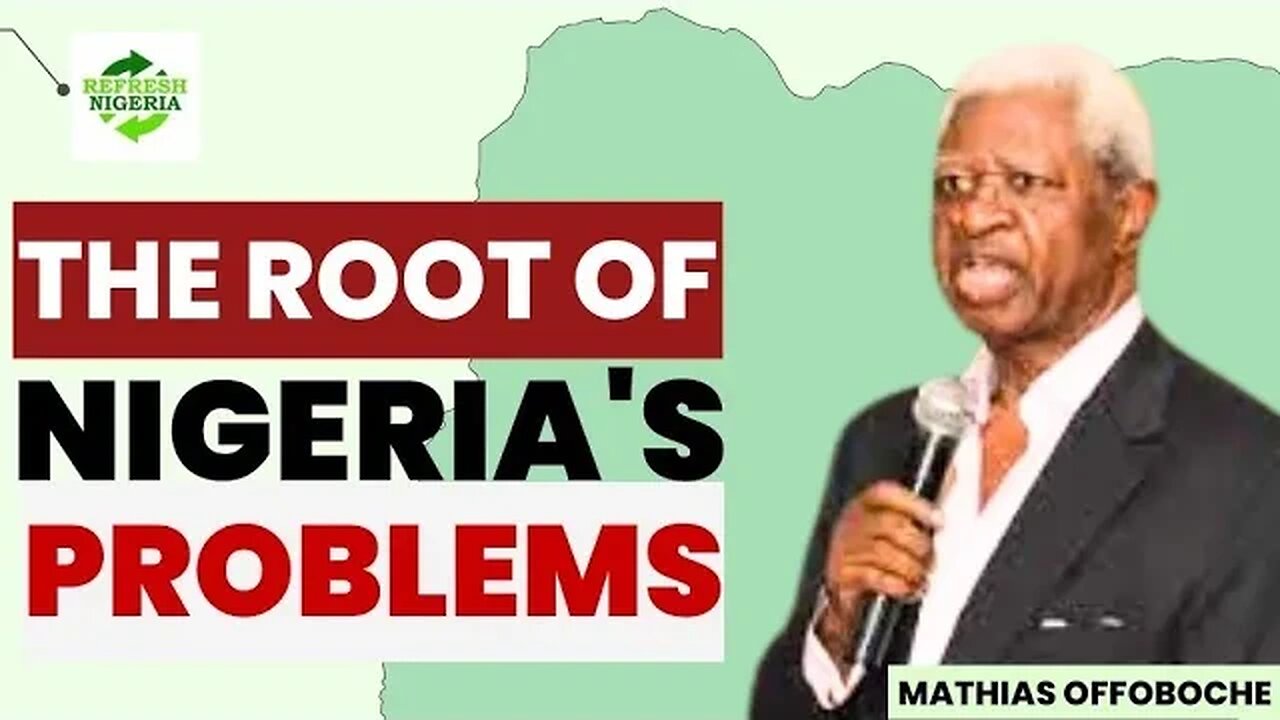Premium Only Content

Reflecting on the Root of Nigeria's Challenges: Mathias Offoboche's Perspective
Reflecting on the Root of Nigeria's Challenges: Mathias Offoboche's Perspective
Mathias Offoboche, a prominent Nigerian scholar and analyst, offers his perspective on the root causes of Nigeria's challenges. Drawing from his extensive research and experience, Offoboche sheds light on the underlying factors that contribute to the nation's struggles.
In Offoboche's view, Nigeria's challenges stem from a combination of historical, political, and socioeconomic factors that have shaped the country's trajectory. He emphasizes the deep-rooted issues that have hindered Nigeria's progress and explores their interconnectedness.
One significant aspect that Offoboche highlights is the legacy of colonialism and its lasting effects on Nigeria's governance structures. He argues that the imposition of artificial borders and the unequal distribution of resources during the colonial era laid the groundwork for ethnic and religious divisions that continue to plague the nation. These divisions have strained intergroup relations, leading to conflicts and impeding efforts towards national unity.
Offoboche also places a strong emphasis on corruption as a central challenge. He delves into the pervasive nature of corruption in Nigeria's political and economic systems, highlighting its detrimental impact on development and public trust. Offoboche asserts that the mismanagement of public funds and the lack of accountability have undermined governance institutions, stifled economic growth, and perpetuated socioeconomic inequalities.
Furthermore, Offoboche addresses the economic disparities within Nigeria. He delves into the unequal distribution of wealth and opportunities, which he believes have marginalized large segments of the population. Insufficient access to quality education, healthcare, and employment opportunities have exacerbated poverty levels and contributed to social unrest.
Offoboche also sheds light on the security threats that Nigeria faces. He discusses the rise of insurgent groups, such as Boko Haram, and their impact on the country's stability. Offoboche argues that addressing the underlying grievances that fuel these movements, such as socioeconomic marginalization and limited governance effectiveness, is crucial for long-term security.
In his overall perspective, Offoboche underscores the need for comprehensive solutions to tackle Nigeria's challenges. He advocates for reforms in governance, the establishment of strong institutions, and the promotion of inclusivity to address ethnic and religious divisions. Offoboche also emphasizes the importance of combating corruption, reducing economic inequality, and investing in infrastructure and social services to foster sustainable development.
It is important to note that Mathias Offoboche's perspective represents a particular viewpoint and should be considered alongside other perspectives and scholarly analyses to gain a comprehensive understanding of Nigeria's challenges.
-
 LIVE
LIVE
Jeff Ahern
59 minutes agoNever Woke Wednesday with Jeff Ahern (big time speech)
655 watching -
 39:10
39:10
Producer Michael
18 hours agoINSIDE AN INSANE MIAMI SUPERCAR COLLECTION!
14.6K3 -
![Dems Proved They Hate America & Angry They Can’t Lord Over All Americans [EP 4461-8AM]](https://1a-1791.com/video/fwe2/9c/s8/1/0/2/G/p/02Gpy.0kob-small-Dems-Proved-They-Hate-Ameri.jpg) LIVE
LIVE
The Pete Santilli Show
10 hours agoDems Proved They Hate America & Angry They Can’t Lord Over All Americans [EP 4461-8AM]
1,966 watching -
 12:32
12:32
Melonie Mac
20 hours agoAmouranth 2A's Intruder
14.7K26 -
 16:39
16:39
Scammer Payback
15 hours agoNo Mercy for this Scammer
12.6K12 -
 31:19
31:19
Uncommon Sense In Current Times
16 hours ago $2.66 earned"The Truth About Government Waste: How USAID is Failing & What Christians Must Do w/ Cheryl Chumley"
12.7K4 -
 1:00:32
1:00:32
Trumpet Daily
21 hours ago $4.24 earnedA Dangerous Era of Rearmament - Trumpet Daily | Mar. 4, 2025
14.8K8 -
 3:25
3:25
Gun Drummer
22 hours ago $0.99 earnedDrowning Pool - Bodies, Gun Cover
11.5K12 -
 8:04
8:04
New York Post
1 day agoEXCLUSIVE: Was President Trump's would-be assassin Thomas Crooks part of a larger conspiracy?
15.8K17 -
 3:06:37
3:06:37
TimcastIRL
13 hours agoLIVE: Trump Joint Presidential Address, IRS To Fire 45,000 Staff w/Rachel Wilson | Timcast IRL
435K350